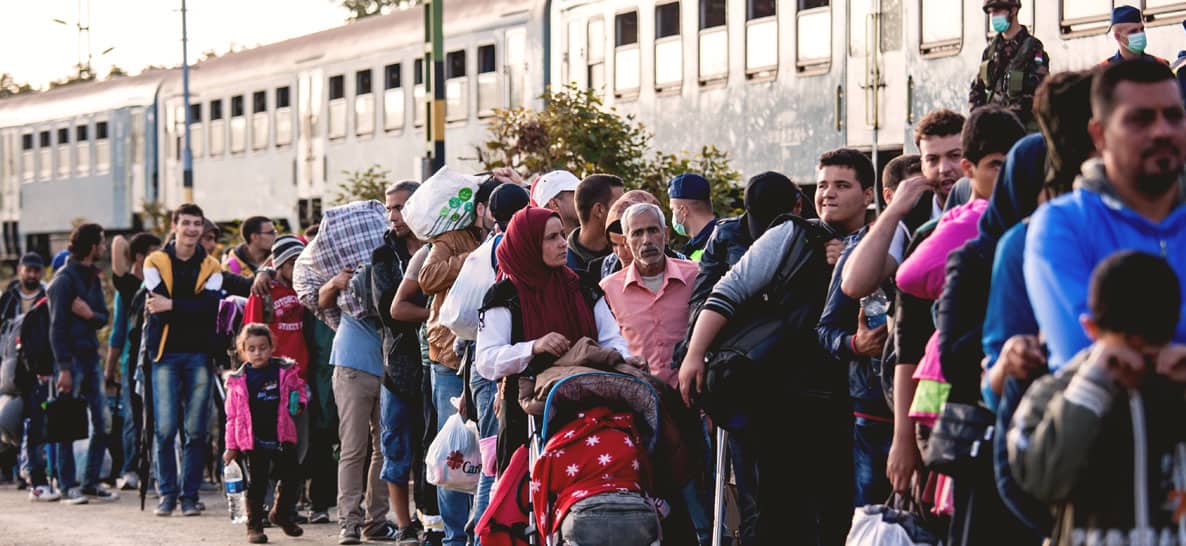
Turkey: More than 2 million
Lebanon: More than 1 million
Jordan: More than a half million
Germany: Hundreds of thousands
Greece: Hundreds of thousands
Egypt: More than a hundred of thousand
Canada: More than 30,000*
The United States: 10,000
This week, the U.S. ambassador to Jordan announced that the 10,000th Syrian refugee would be welcomed to America in the coming days. This means the U.S. reached the goal set by President Barack Obama last year, as he committed to resettling Syrians displaced by the civil war in Syria—one of the worst ongoing wars in modern history.
These are people whose homes have been destroyed by barrel bombs. Who’ve been targeted by chemical weapons. Who’ve watched entire cities turned to rubble. Who’ve fled the evils of ISIS. Who’ve watched their own children drown while attempting dangerous journeys over uncertain seas.
10,000 may sound like a large number. But compared with the number of refugees in other countries around the world—and considering the resources of the United States—it’s remarkably small.
The U.S. can do better.
For Such a Time as This
We are in the midst of one of the worst humanitarian disasters in modern history. Millions of people need the world’s help.
More than 11 million Syrians have been forced to flee their homes since the fighting began five years ago, and more than 5 million are now refugees in foreign countries.
Most of them are children.
In refugee camps, families are forced to live in overcrowded tents, and many face the prospect of never leaving. Mothers and fathers may no longer have homes to bring their children back one day.
Displacement may be permanent.
For many, there is no end in sight for the end of the nightmare they are currently living.
Compassion Over Fear
The resettlement of Syrian refugees remains a contentious issue in America. In recent months, governors across the country said that refugees would not be welcome in their states (even though, rejecting them isn’t even legal).
Politicians use the issue as a rallying cry for even more restrictive immigration policy.
Many Americans, more motivated by fear of the unknown and self-preservation than compassion for war victims, ignore facts in favor of rhetoric.
Despite the claims of some politicians fighting the entry of Syrian refugees, these are some of the most vetted individuals ever to enter the United States. They aren’t simply people who’ve come to the United States looking for help. These are the most vulnerable families and children we’ve specifically chosen to help after months of interviews and background checks—not just because they don’t have ties to terror groups, but because they are vulnerable to exploitation.
But fear can be a greater motivator than reason.
That’s why Christians must be a voice not only for rational thinking, but also for compassion and love.
Arrogant and Unconcerned?
Many Sunday school students are familiar with the fate of the cities of Sodom and Gomorra: God brought down fire and brimstone, wiping them off the map.
The book of Ezekiel explains what made God so angry: “Now this was the sin of your sister Sodom: She and her daughters were arrogant, overfed and unconcerned; they did not help the poor and needy.”
Arrogant. Overfed. Unconcerned.
The call to help those in need is at the heart of the gospel. And, when it’s flatly rejected—out of fear, arrogance, entitlement or apathy—something is badly broken.
America is the richest, most powerful nation in the history of the earth. Sure, we are not without our problems, but we were founded on an ideal many try to preserve to this day. While traveling to settle the New World, Massachusetts Bay Colony governor and preacher John Winthrop wrote, “We shall be as a city upon a hill, the eyes of all people are upon us.”
A group of millions of people devastated by war, rejected by closed borders and desperate for hope need our help. Ambassador Wells said that 10,000 represents “a floor, not a ceiling.” The future will tell if she’s right about that.
As Christians, it’s our duty to vote with our convictions, to make our voices known and open our arms to those in need.
How we act toward those who are begging for our help isn’t just a show of compassion. It’s a display of our faith in a God who calls us to serve those in need.
The eyes of all people are upon us.
*Numbers are based on a variety of sources, though, because of the nature of the issue and complexity of migration, exact estimates tend to vary.






















